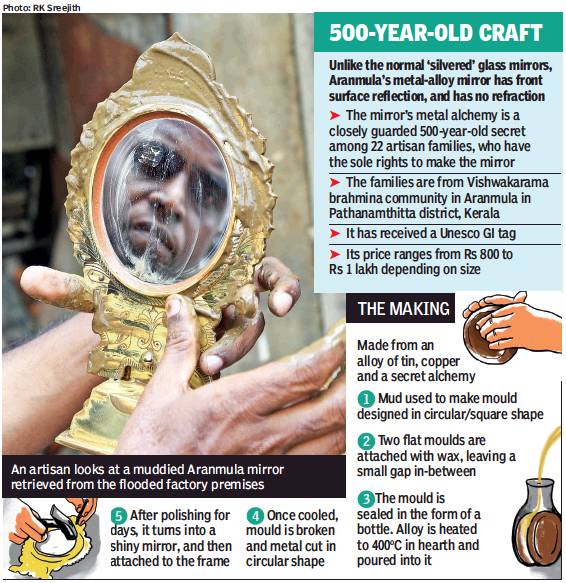Aranmula Kannadi (unbreakable mirrors)
This is a collection of articles archived for the excellence of their content. |
Impact of Kerala floods in 2018
Loss of 6,000 mirrors+raw materials worth Rs 1.5 crore.
Viju B, Makers of unbreakable mirror try to pick up pieces, August 30, 2018: The Times of India

From: Viju B, Makers of unbreakable mirror try to pick up pieces, August 30, 2018: The Times of India
As the Pamba river cascaded upwards, entered the state highway and into P Gopakumar’s workshop, he decided to shut shop for the day. But the water hit the walls of the workshop and threw the doors open and his beloved mirrors floated out.
“I was going mad, trying to catch one mirror after the other as it was drifting outside. The water was neck high by then and several mirrors that were fixed on wooden frames floated away,” he says.
These are not ordinary mirrors, but the symbol of one the oldest living traditional crafts of Kerala, born of a secret alchemy of tin and copper known to only 22 artisan families living in Aranmula today.
Ordained as the state’s official gift, the famous Aranmula Kannadi were presented as gifts to the likes of US President Obama to Prince Charles, not to mention presidents and prime ministers of India.
But the Kerala floods has taken away the livelihoods of these artisan families.
“We had received decent orders from foreign tourists who were planning to visit Aranmula to not only watch the famous Aranmula boat race and but also to collect the mirrors from our shops,” says KP Ashokan, president of Vishwbrahmina Aranmula Mirror Nirman Society.
The society said the artisans have lost around 6,000 mirrors and raw materials with the total loss valued at around Rs 1.5 crore.
The Aranmula mirror is a customised piece of artwork with a Unesco GI tag. It is illegal to even sell it in private curio shops.
“The state has given us the sole rights to make it and sell it in order to preserve the small and dying traditional craftsmanship of Aranmula,” says Ashokan.
The floods have destroyed the artisans’ workshops and their homes. “Our hearths, coal, minerals and indigenous clay have all been taken away by the river,” he adds.
The picturesque temple town, situated on the banks of the Pamba, is home to the Parthasarthy temple and hosts what is arguably the oldest boat race in the world. It was declared a heritage village by the state government. The 400-year-old boat race is a celebration of the 52 Karas -- villages -- situated along the riverbank and coincides with the Aranmula Sadhya, in which over 10,000 people are given a sumptuous lunch with 100 curries on the temple premises at the end of Onam festivities.
“This time we are not having the boat race or the sadhya. This was a place where everything was in plenty, but today we don’t have water to drink as the wells are filled with muck,” said Hari S, a local.
The artisans of Aranmula have lost around 6,000 mirrors and raw materials with the total loss valued at around Rs 1.5 crore